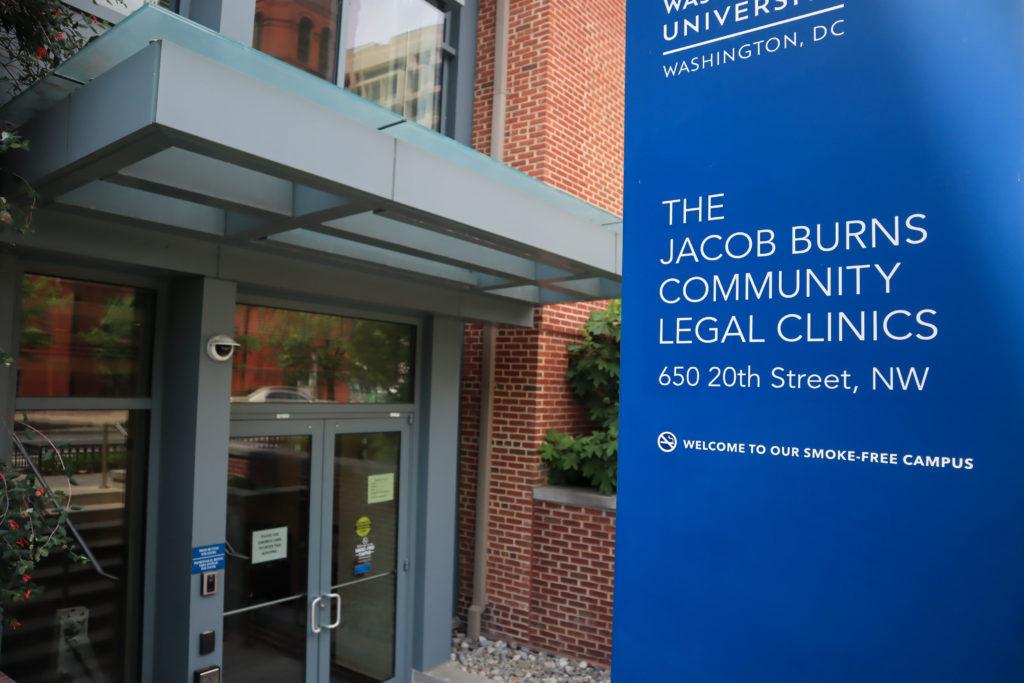GW Law’s Jacob Burns Community Legal Clinics will offer five new clinics in the fall semester, which faculty say will help meet the large student demand for professional experiences they need to succeed after graduation.
Officials will offer one health equity policy and advocacy clinic and four civil access to justice clinics in education-access advocacy, nonprofit and entrepreneurship, prison civil rights and workers’ rights divisions for the first time this fall, according to a GW Law release last month. Laurie S. Kohn, the associate dean for clinical affairs for the Jacob Burns Foundation and the director of the family justice litigation clinic, said the new clinics demonstrate the law school’s commitment to expanding student access to “legal skills and training” through clinical experience.
Kohn said the new clinics will expand upon the policy topics covered in curriculum and give more students access to a “D.C.-infused education” by looking at where students can help members of marginalized communities and practice legal assistance, a goal that aligns with a pillar of GW Law’s strategic plan — strengthening academic programs and offerings — that outlines strategies for advancing clinics at the law school through 2025. Kohn said determining where the community can benefit from free legal assistance is a “critical motivation” in selecting the subject matter of each new clinic.
“When considering expansion, we work closely with our community partners, the local court systems and our community itself to determine where services are needed most,” Kohn said.
Kohn said 130 students are enrolled in clinics for fall 2023 while 256 students applied. The GW Law website states that the law school currently offers a total of 17 clinics in topics including immigration, health rights and domestic violence, with five additions coming this fall. Second- and third-year law students participate in the clinics for 4 to 6 credits but are not paid, according to the website.
“Our hope is that ultimately every student who wishes to take a clinic will have a seat,” Kohn said in an email. “We consistently seek to grow opportunities for our students to achieve the best possible academic experience and part of that is immersing them in real-world curriculum.”
Kohn said the clinics help GW Law meet the American Bar Association’s requirement of offering “experiential learning opportunities” to students as mandated by the American Bar Association. She said clinical learning gives students the opportunity to connect with professors and gain hands-on legal experience before graduating, which is why officials set the 8-to-1 student-to-faculty ratio.
“Students develop deep substantive relationships with their faculty who, in turn, get to know their work so that they can act as mentors and advocates for students entering the job market,” Kohn said. “Students develop their professional identities through their practice of law and interactions with clients, opposing counsels, judges and lawmakers.”
David Johnson, the director of the Civil Access to Justice Clinic — Education Access Advocacy Division and assistant dean for pro bono and advocacy programs, said his new clinic is the only one offered by the law school that focuses on litigation in education and gives students experience with the speed and severity of real-world litigation. Johnson said his students will represent D.C. Public School students who are facing suspension trials at the D.C. Office of Administrative Hearings.
“If you are a student in DCPS and you are suspended, you are entitled to a hearing in a matter of days,” Johnson said. “So this seems to me, we’ll see if it works next semester, the perfect sort of bite-sized litigation for a student, you only got a few days to get ready.”
Johnson said the clinics provide an opportunity for law students to learn oral and written advocacy skills necessary to represent clients when they graduate. Johnson said all of the law clinics are centered around giving students the opportunity to apply what they are learning to the type of work they will be expected to do as a professional in their field.
“Lawyers are not paid to take tests,” Johnson said. “Lawyers are paid to represent people and representing people only occurs in two ways, through oral advocacy, written advocacy, even if it’s not confrontational, and then we have a small business clinic here.”
Renée Gentry, a professorial lecturer in law who directs a preexisting vaccine injury litigation clinic, which is offered each year over two semesters, said she would like to see GW offer more clinics in the coming years because there is still a higher level of student interest than spots available.
“We just talked about it in a faculty meeting, I think last month, that we still have a big group of students that don’t get clinics because there’s just not enough spaces,” Gentry said. “So absolutely, I think any law student that wants to take a clinic should be able to take a clinic.”
Gentry said GW Law’s clinical program sets students up to succeed in the professional world because they require industry experience that employers look for in the hiring process.
“Most times when you graduate from law school, a lot of what you find is a lot of the entry level positions already want two years of experience and that’s really hard to do when you’re in law school,” Gentry said. “So a clinical setting gives you that ability to do that.”
Gentry said these clinics are designed to give students exposure to the value of public interest law while gaining general professional experience and helping the larger community.
“A lot of times the clinics are pro bono or they help people that are in underserved communities, people that are sort of vulnerable in society,” Gentry said. “It’s a great thing to sort of teach students and get them grounded in public interest and pro bono work.”








